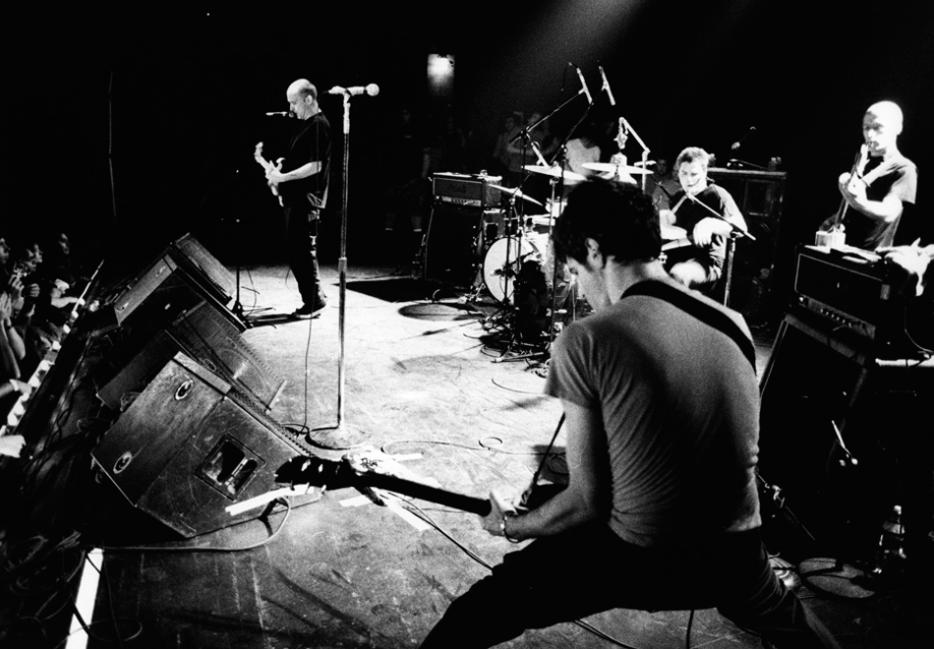The two most important aspects of Fugazi were the two things that drove people the craziest: their popularity and their priggishness. Their popularity annoyed people because it made the band hypocrites. (If they really wanted to change things, they wouldn’t play Roseland Ballroom!) Their self-righteous scolding annoyed people because, generally speaking, people don’t enjoy being self-righteously scolded. (They made sure that all dancing at their shows was just that—dancing. No moshing, no slam dancing, no circle pits or stage dives, just dancing or standing still. And there better be some women up front.) But the ability to get 1,000 people who would just as soon be at a Pearl Jam show into a sweaty box and then tell them exactly how and when to dance? These were the kinds of attributes that briefly made Fugazi… well, I was going to say “the most important (white) rock and roll band ever,” but the hyperbole of rock writing, while certainly my bag, isn’t appropriate for these guys. So let’s say these two characteristics, despite being arguably antithetical to the willfully cloistered and aggressively freewheeling counterculture, made Fugazi a very fine thing indeed.
Once their third album, In on the Kill Taker, came out in 1993—June 30 will be its twentieth anniversary—Fugazi releases would chart on Billboard without fail. To have that sort of bully pulpit and actually use it to bully—to cajole and hector fans into seeing those around them as more than just springboards for their own physical pleasure—was a political move, more so than just telling them to rock the vote or be nice people. Most of us already think of ourselves as nice people, but we often need a bit of a nudge for that to translate into any actual sacrifice of desire. Being told at certain shows that we were expected to not do exactly what we wanted for the cause of a greater good, and to then think about why that was expected of us, was, for many, the first step in forming a truly progressive identity.
And In on the Kill Taker was pretty good. I was more into their fast and rhythmic stuff, but it was the soundtrack, along with Rodan and Lync, to all the indie punk squalor in which I was living in the early ’90s. I am not a music critic, so let’s just take Fugazi at their word when they said that, when they started, they wanted to sound like “The Stooges and reggae.” This applies to all pre-In on the Kill Taker material. All post-In on the Kill Taker material can be best described by taking any Sonic Youth review (do you have a copy of Pitchfork handy? Good) and just putting the phrase, “That, but not as boring as…” before or after every sentence. When it came out, I was profoundly bummed. I couldn’t hear the bass, and the anthemic choruses of yore seemed to have been locked out of the studio. As I got older and became the super genius I am today, though, I grew to love it. I think that’s what critics mean by “difficult but rewarding.” Of course, now, with all of the noisier hardcore that the album influenced, it hardly seems difficult at all.
In retrospect, even though it was recorded as George H. W. Bush was leaving office, that it came out under Clinton seems correct. The album is the perfect accompaniment to the ambivalence and sour notion that “our” guy wasn’t maybe ours at all, and that the hammer was just going to keep coming down. Fugazi had already moved away from the forward motion and fist-pumping of Repeater with the more meditative groove of Steady Diet of Nothing, but on …Kill Taker, the band was chanting death dirges over guitars left ignored and squealing against the amps. Goodbye to the almost joyful defiance of punk under Reagan and Bush: here was feedback and drone and self-immolation. Even a beaten down Fugazi, however, was still a feral proposition. The band’s charms are apparent in the album. It’s accessible despite the rawer elements, and people like it, but when Ian MacKaye screams “you’d make a great cop,” it’s clear that he isn’t talking about the safe other “you” so popular in rock, but about the listener. And he or she had better watch out before they wake up on the wrong side of the law—the side with the jackboots and nightsticks.
They were scolds. They were schoolmarms. Fugazi wanted you to straighten up and fly right, even when you were getting a Crass tattoo at Flyrite. In 1992, being told not to slam-dance or stage-dive was a very big deal. And, despite what your older sibling might tell you, it wasn’t just the influx of bro culture that grunge was bringing into punk and hardcore: shit had been dude-violence-heavy since Black Flag primitivism and machismo stormed the floor. Of course, the members of Fugazi’s previous bands were equally guilty of starting punk’s shift into jock culture (whoopsy daisy, straight-edge). They didn’t do it on purpose, though, and they seemed awfully embarrassed by the whole youth crew quagmire they’d inadvertently created on the East Coast. But by the early ’90s, even straight-edge and the more intellectual nihilistic aspects of hardcore had been to a large extent sidelined; everybody11For the purposes of this article, “everybody” refers to “a shit ton of people,” not you. I know you were manning the Food Not Bombs table and feeding an orphan bunny with your free hand. But write and yell at me anyway. I like hearing from you. just wanted to dress like shit and kick each other in the head. They wanted to “have a good time.” They might as well have been Bryan Adams fans with testosterone problems.
Fugazi, bless their hearts, were stridently and gloriously against fun. I think this was important. Not because I’m necessarily against slam-dancing—I’m not a fan, but more out of cowardice than ideology—but because I think it’s necessary for any band or organization that makes gestures towards being politically meaningful to, at some point, tell its core audience that they are doing it wrong, that they themselves are wrong, and that they should and must do better. Comfort is the enemy of change, and if your audience is hugely comfortable, then you must challenge them. Not just by being artistically challenging,22Note to DJs trying to “scare” straights: Yuppies give no fucks that you’re playing Cabaret Voltaire. If there’s even one consenting adult in the bar, they’re staying. but by actually making them do things they don’t want to do. Nobody will ever be moved to political activism in any real way unless their underlying assumptions are challenged. Telling someone that they can’t stage dive—that they are not, in fact, the most important person in the world—is huge in that regard. It might have alienated some, but life is not a back rub. Cry now, agitate later.
They were not the only band doing this, but they were far and away the most popular one. This is not to marginalize Riot Grrrl or any other bands who were equally vocal in standing apart from a pervasive mook culture. It is, however, to posit that, even if their white maleness was a large factor in Fugazi’s popularity, that popularity allowed them to wield an influence that other bands, equally talented, but maybe weirder or more female, couldn’t achieve at the time.
Look, stuff can be wicked inspiring. Astronauts inspire us. Politicians (in other countries) inspire us. Aung San Suu Kyi, when not ignoring Buddhist massacres of Muslims, inspires the shit out of us. When Pussy Riot was in the news and not just quietly serving prison sentences, you couldn’t walk a city block without running into someone who was inspired by them. Inspired to work to reform the US penal system? Not so much, maybe, but inspiration is, you know, ineffable. People will endlessly tell you how much any given band at any given moment “inspires” them, but what is inspiration without action? If something simply inspires you to “carry on,” then isn’t it really just the preferred soundtrack to your own continued breathing?
Now, do I know that thousands of truants went to Fugazi shows and then became social workers? Neeeeyope, I really don’t. If anyone has any hard numbers, I’d love to see them. I know that the little I do (volunteer stuff, thank me in person) is not because my parents were activists and/or worked in “good for humanity” fields (they were/do, thank them with gift certificates to Chi-Chi’s). It’s because I have a little Guy Picciotto that lives behind my ear, constantly yelping into my brain, “If you don’t go volunteer a certain number of hours this month, you are a terrible person.” I find this voice helpful.
But in the long run, mass-scale influence is not inherently superior to that which occurs on a smaller scale. The ten people influenced by Bikini Kill or Spitboy maybe becomes twenty becomes a thousand, and eventually surpasses the immediate large numbers that Fugazi was able to reach. Again, though, influenced to do what? To believe that any rock or punk or hip hop can actually change a person, not just give them comfort or bolster their already confused notions of the world, is to indulge in the kind of idealism that can only come with the privilege of, you know, not being actively oppressed or starving. So it’s really just a notion, not even a reasoned argument—sorry, Internet—but it’s a belief I hold regardless. A raging against darkness, even the (maybe low-stakes) darkness of the souls of men who paid five dollars to see your band and really want to jump feet-first onto the girl who just wants to stand up front and watch, is a worthwhile endeavor. Men can change. Selfish is the default, but it’s not the guarantee.






